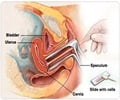A new study reveals that mothers who receive flu shots or Pap screenings were more likely to ensure that their sons received the quadrivalent human papillomavirus vaccine (HPV4).

The study also found that boys whose mothers had a history of genital warts were 47 percent more likely to receive the HPV4 vaccine although the researchers note that this association did not reach statistical significance. In addition, HPV4 vaccine uptake was found to be higher among boys who were Hispanic, resided in neighborhoods with lower levels of income and educational attainment, and enrolled in a Medicaid program.
"Our study findings suggest that a mother's receipt of preventive services may have an impact on their son's HPV4 vaccination," said Rulin Hechter, MD, PhD, study lead author and researcher with the Kaiser Permanente Southern California Department of Research & Evaluation. "These mothers might be more familiar with preventive measures for HPV infection, influencing their decision to have their children vaccinated."
According to the Centers for Disease Control and Prevention, HPV is a common virus that is easily spread by skin-to-skin contact and is considered to be the main cause of cervical cancer in women with about 12,000 new cases each year in the United States. The CDC considers the HPV vaccine a safe and effective way to protect females and males against some of the most common types of HPV and the health problems the virus can cause.
In October 2009, the CDC's Advisory Committee on Immunization Practices, or ACIP, issued a permissive use recommendation for the HPV4 vaccine, which meant that the vaccine was recommended for boys aged 9 to 26 to reduce the likelihood of acquiring genital warts but it was not included in the routine childhood vaccine schedule for boys. In these instances, parents often played a deciding role as to whether their sons would receive the vaccine. However in late 2010, the CDC approved the new vaccine indication for anal cancer. In 2011, the ACIP issued a routine use recommendation of HPV4 vaccination in males aged 11 to 12 years. Under a routine use recommendation, physicians are more likely to promote the vaccine. The researchers are collecting additional data following the introduction of indication for anal cancer and routine use recommendation to further understand the impact of the changes in recommendation on uptake of this vaccine among boys.
"Given that vaccination offers an opportunity to achieve community immunity and reduce transmission of HPV, understanding a mother's health-seeking behaviors may help health care professionals develop strategies for increasing vaccination rates among adolescent boys," Hechter said.
 MEDINDIA
MEDINDIA



 Email
Email









